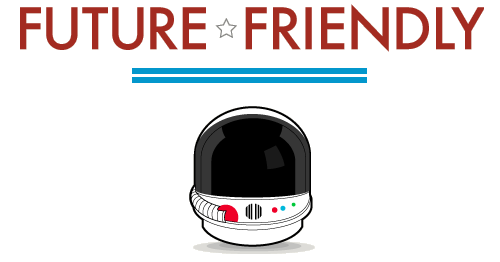In September 2011 ten folks disappeared into the Tennessee woods to talk all things mobile at a gathering that became known as Mobilewood. One of the main products of their conversations was the concept of Future Friendly (@future_friendly). A slick slidedeck from Brad Frost (@brad_frost) does a good job of summing up what Future Friendly means. Or, hell, just check it out in the words of the attendees since you can't beat their first-hand accounts.

The core tenets of Future Friendly are:
- Acknowledge and embrace unpredictability.
- Think and behave in a future-friendly way.
- Help others do the same.
Dave Mulder (@muldster) does a good job summing up the output of Mobilewood:
Future Friendly is more the outcome of a Constitutional Convention than it is a practical set of laws. A "when you do stuff, do it with this in mind" mode of thinking.
That mode of thinking gives us flexibility to interpret the core tenets in a broad way and apply them to specific domains. With that in mind I've been thinking about how they might be applied to higher education.
The Future Friendly Campus: A Manifesto
What they have to say on the Future Friendly website echoes some ideas that have been floating around in my head for a while. It's still taken me another month to put those ideas down on paper. What follows is my interpretation of what Future Friendly should mean to higher education and how we can think in our own future-friendly way that builds on the original.
- The networked society. The always-with-us mobile device will allow for the always-on, always-connected campus. We need to look beyond silo-ed, one-way mobile sites or native apps towards more personal, two-way applications that take advantage of this change in society. One day a student's chosen smartphone will serve as their student ID, library card, and method of payment.
- Data & content should be set free. Traditional silos of content and data need to come crumbling down. Our data and content will be mashed up in any number of ways and pushed out to our myriad of websites, apps, and new-ish mediums like digital signage. It's time for departments to start sharing so when can make our data and content as useful as possible to our users.
- API First. APIs are the bedrock upon which all of our solutions are going to be built on in the future. Finally, it really is all about strong separation of business logic and presentation. I would love to see schools develop, document, and publicize public APIs for anyone in a campus community to play with.
- Services should be accessible and accessible. In a networked society we obviously want to deliver our services to a multitude of devices (not just the latest iOS device) but we also need to deliver those services to our users with disabilities. Everyone should be able to access what we have to offer.
- *Don't worry about being known. Worry about being useful. *You can't go wrong by focusing, laser-like on the needs of your users. At the end of the day, if you're useful to your constituents then being known will take care of itself. A good example of where we often get focused on "being known" and therefore may not be as "useful" as we can be is the university home page.
- Don't lose sight of the past. Technology is not always the answer. We should never change a process to introduce tech for tech's sake or to minimize back-end workload if puts access to a resource out of reach for most because of cost. Not everyone can afford the "future" quite yet.
- Share your knowledge. The one thing that I've been struck by over the last few years in higher education is this… we know our stuff. We can be and are leaders in technology. We're laying down the best practices that others will follow. If you're doing something new or different then share! Our community always welcomes new voices with new ideas.
- *The Future Friendly Campus is about more than just mobile.* To take a theme that is so mobile-focused and generalize it is probably bad form. The problem is that mobile is only one set of technologies that we should be thinking about in a future friendly-way in higher education. We shouldn't lose sight of where else these principles could be applied.
What's missing from the manifesto? Academics!
What's the huge hole in this manifesto focused on higher education? There is nothing here specifically about academics. Admittedly, most of the points can be applied to academic systems but I'm probably missing something since my day-to-day job doesn't involve academics whatsoever. For this manifesto to really be fleshed out I'd love more feedback on how we can think in a Future Friendly Campus-way in the academic realm as well (e.g. mobile learning).

Planting the Seed: This is Just a Starting Point
For some, these ideas may seem totally obvious or even old hat. For others, these suggestions may appear intimidating, unrealistic or unworkable. The key thing to remember is that nothing changes overnight. I strongly believe that higher education does have to embrace a Future Friendly Campus mindset as we move forward. The ways in which our users will want to interact with us, the types of tasks they'll want to complete, and the types of devices we'll want to deliver to will just continue to proliferate. Now is the time to reevaluate. In the meantime you can post comments below or take your ideas to an outlet like iMobileU or UWEBD. Let me know what you think.
Graphic Credits
The Future Friendly graphic was created by… well, some of the Future Friendly folks. Does this count as attribution for Creative Commons? The seed graphic are two slides that I combined from Brad Frost's and Jack Bishop's talk "Selling the Mobile Web."